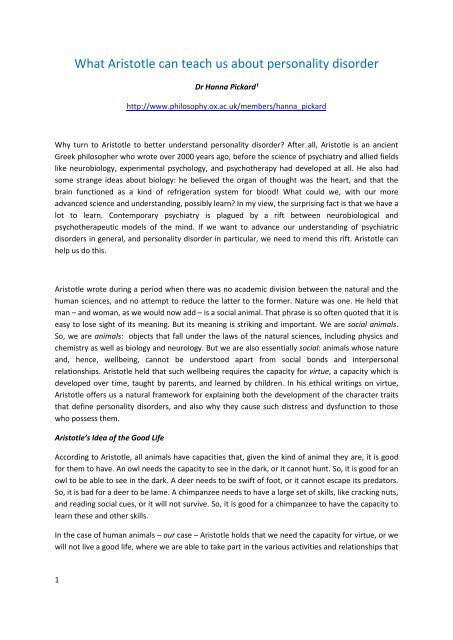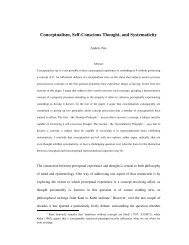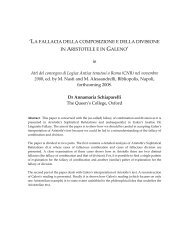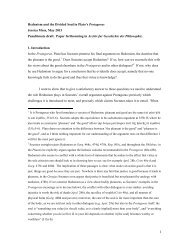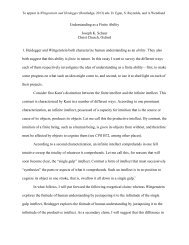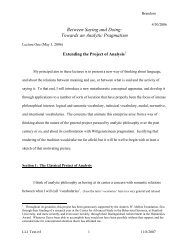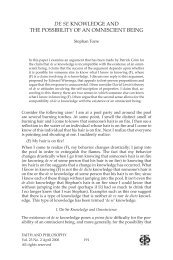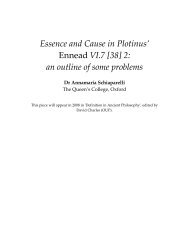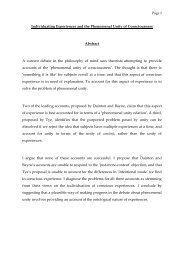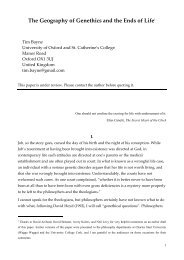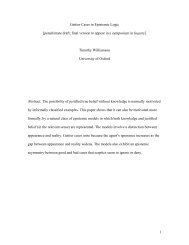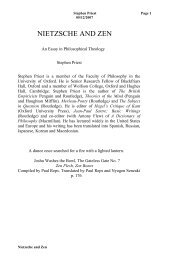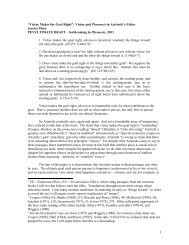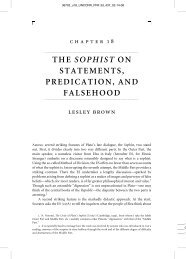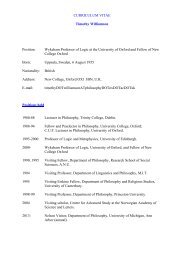What Aristotle can teach us about personality disorder - University of ...
What Aristotle can teach us about personality disorder - University of ...
What Aristotle can teach us about personality disorder - University of ...
Create successful ePaper yourself
Turn your PDF publications into a flip-book with our unique Google optimized e-Paper software.
<strong>What</strong> <strong>Aristotle</strong> <strong>can</strong> <strong>teach</strong> <strong>us</strong> <strong>about</strong> <strong>personality</strong> <strong>disorder</strong><br />
Dr Hanna Pickard¹<br />
http://www.philosophy.ox.ac.uk/members/hanna_pickard<br />
Why turn to <strong>Aristotle</strong> to better understand <strong>personality</strong> <strong>disorder</strong>? After all, <strong>Aristotle</strong> is an ancient<br />
Greek philosopher who wrote over 2000 years ago, before the science <strong>of</strong> psychiatry and allied fields<br />
like neurobiology, experimental psychology, and psychotherapy had developed at all. He also had<br />
some strange ideas <strong>about</strong> biology: he believed the organ <strong>of</strong> thought was the heart, and that the<br />
brain functioned as a kind <strong>of</strong> refrigeration system for blood! <strong>What</strong> could we, with our more<br />
advanced science and understanding, possibly learn? In my view, the surprising fact is that we have a<br />
lot to learn. Contemporary psychiatry is plagued by a rift between neurobiological and<br />
psychotherapeutic models <strong>of</strong> the mind. If we want to advance our understanding <strong>of</strong> psychiatric<br />
<strong>disorder</strong>s in general, and <strong>personality</strong> <strong>disorder</strong> in particular, we need to mend this rift. <strong>Aristotle</strong> <strong>can</strong><br />
help <strong>us</strong> do this.<br />
<strong>Aristotle</strong> wrote during a period when there was no academic division between the natural and the<br />
human sciences, and no attempt to reduce the latter to the former. Nature was one. He held that<br />
man – and woman, as we would now add – is a social animal. That phrase is so <strong>of</strong>ten quoted that it is<br />
easy to lose sight <strong>of</strong> its meaning. But its meaning is striking and important. We are social animals.<br />
So, we are animals: objects that fall under the laws <strong>of</strong> the natural sciences, including physics and<br />
chemistry as well as biology and neurology. But we are also essentially social: animals whose nature<br />
and, hence, wellbeing, <strong>can</strong>not be understood apart from social bonds and interpersonal<br />
relationships. <strong>Aristotle</strong> held that such wellbeing requires the capacity for virtue, a capacity which is<br />
developed over time, taught by parents, and learned by children. In his ethical writings on virtue,<br />
<strong>Aristotle</strong> <strong>of</strong>fers <strong>us</strong> a natural framework for explaining both the development <strong>of</strong> the character traits<br />
that define <strong>personality</strong> <strong>disorder</strong>s, and also why they ca<strong>us</strong>e such distress and dysfunction to those<br />
who possess them.<br />
<strong>Aristotle</strong>’s Idea <strong>of</strong> the Good Life<br />
According to <strong>Aristotle</strong>, all animals have capacities that, given the kind <strong>of</strong> animal they are, it is good<br />
for them to have. An owl needs the capacity to see in the dark, or it <strong>can</strong>not hunt. So, it is good for an<br />
owl to be able to see in the dark. A deer needs to be swift <strong>of</strong> foot, or it <strong>can</strong>not escape its predators.<br />
So, it is bad for a deer to be lame. A chimpanzee needs to have a large set <strong>of</strong> skills, like cracking nuts,<br />
and reading social cues, or it will not survive. So, it is good for a chimpanzee to have the capacity to<br />
learn these and other skills.<br />
In the case <strong>of</strong> human animals – our case – <strong>Aristotle</strong> holds that we need the capacity for virtue, or we<br />
will not live a good life, where we are able to take part in the vario<strong>us</strong> activities and relationships that<br />
1
make life worth living. These include, for <strong>Aristotle</strong>, friendship and family life, work and productivity,<br />
and physical and intellectual pursuits and pleasures.<br />
Whenever we think <strong>about</strong> what makes life worth living, it is essential to recognize the existence <strong>of</strong><br />
cultural and individual differences in what is valued and what is enjoyed, and respect other<br />
perspectives. Different things <strong>can</strong> make life worth living for different cultures and individuals, and it<br />
is wrong to presume that we inevitably know what these things are for others. But that said,<br />
<strong>Aristotle</strong> is surely right that most people care <strong>about</strong> friendship, family, work and pleasure. It is not<br />
easy to see how a life without these things could that be a good life, a life <strong>of</strong> value that felt to its<br />
subject to be worth living. Furthermore, he is also right that we need virtue to achieve these goods.<br />
By virtue, <strong>Aristotle</strong> means the possession <strong>of</strong> a stable set <strong>of</strong> character traits that allows <strong>us</strong> to think,<br />
feel, and act in the right way, to the right degree, at the right time – to think, feel, and act as the<br />
situation confronting <strong>us</strong> demands. For <strong>Aristotle</strong>, virtue is a mean – a balance – between extremes. In<br />
contrast to virtuo<strong>us</strong> character traits, traits that lie at the extremes do not allow people to think, feel,<br />
and act as the situation demands.<br />
To ill<strong>us</strong>trate this idea, consider a favourite ancient Greek example: the demands <strong>of</strong> war and battle.<br />
At one extreme in battle is the coward. The coward cringes and flees when confronted with the<br />
enemy, no matter the importance <strong>of</strong> the ca<strong>us</strong>e he is fighting for, allowing thoughts <strong>of</strong> death to<br />
possess him, and his fear to overcome him. This is not to think, feel, and act as the situation<br />
demands. At the other extreme in battle is the rash man. The rash man r<strong>us</strong>hes into battle without<br />
thought and consideration, overcome by his own arrogance and aggression. He has no thought for<br />
the reality <strong>of</strong> the situation – that he might, for instance, be killed, leaving his children without a<br />
father, his wife without a h<strong>us</strong>band. He is foolhardy, and impetuo<strong>us</strong>. Again, this is not to think, feel,<br />
and act as the situation demands.<br />
Finally, in contrast to both these extremes, and lying between them, is the courageo<strong>us</strong> man. He<br />
rightly appreciates the danger he faces, and potential cost to him and his loved ones. But he masters<br />
his fear and acts with assurance, dignity, and self-possession. Afterwards, if he is successful, he may<br />
take pride in his achievements, but he will not mock his slain enemies. He shows virtue, both in his<br />
courage, and in his compassion.<br />
The ancient Greek battlefield is <strong>of</strong> course literally far removed from today’s society, but<br />
metaphorically it is an apt expression <strong>of</strong> what many people, especially those who suffer from<br />
<strong>personality</strong> <strong>disorder</strong>, face daily.<br />
We each have our own battles, and the challenge for each <strong>of</strong> <strong>us</strong> is to find a way to handle ourselves<br />
with virtue when confronted with demanding, difficult, and painful situations: to think, feel, and act<br />
in the right way, to the right degree, at the right time – as the situation demands. To find the mean<br />
between the vario<strong>us</strong> extremes that pulls <strong>us</strong> in opposing and less than ideal directions. Doing so<br />
requires a host <strong>of</strong> stable character traits, such as courage and compassion, but also moderation and<br />
temperance, j<strong>us</strong>tice and fair-mindedness, generosity and empathy, patience and persistence,<br />
productivity, tr<strong>us</strong>t and love and respect for ourselves and others. We need these traits in order to<br />
live the good life, and, especially, to have good friendships and relationships with our family, and to<br />
find work and goals and pleasures that we value, and are able to pursue with commitment and<br />
2
success. We need virtue – a stable, reliable set <strong>of</strong> character traits conducive to the good life – so<br />
that, whatever life throws our way, we are best placed to handle it in a measured and balanced way<br />
that maintains our values and goals alongside our relationships with others. That is how wellbeing<br />
<strong>can</strong> be achieved for <strong>us</strong> humans, given the kind <strong>of</strong> animal we are.<br />
At different times in all our lives, this mean between extremes is very difficult to achieve. Perhaps<br />
we act in anger as opposed to considered reflection when we perceive that someone has wronged<br />
<strong>us</strong>. Or we let fear <strong>of</strong> retaliation stop <strong>us</strong> from standing up for ourselves or others when we are<br />
mistreated or bullied. But it is especially difficult for people with <strong>personality</strong> <strong>disorder</strong> to strike this<br />
balance.<br />
Personality <strong>disorder</strong> is characterized by character traits that involve patterns <strong>of</strong> thinking, feeling, and<br />
acting that are markedly different from social norms and expectations, as well as – and this is key –<br />
pervasive and inflexible. This means that these patterns are set and rigid, as opposed to flexible and<br />
responsive to the situation at hand. These traits are such that the person finds it difficult, if not<br />
impossible, to find a mean between extremes: to appraise each situation, objectively, in its own<br />
right, and respond accordingly with appropriate thoughts, feelings, and behaviour.<br />
From a psychotherapeutic perspective, we <strong>can</strong> understand such pervasive, inflexible traits as relics<br />
<strong>of</strong> the past, enacting entrenched patterns and habits that may have no rightful place in the present.<br />
This radically affects a person’s capacity to maintain good, strong relational ties with others and so<br />
compromises their friendships, family life, and work life. If one sees the present through the veil <strong>of</strong><br />
the past, and the past is such that one naturally finds it hard to love, to tr<strong>us</strong>t, to empathize, to show<br />
generosity, patience, fair-mindedness, then one is cut <strong>of</strong>f from good, strong, stable, relational ties<br />
with friends, family, and colleagues. They will struggle to understand and to maintain a solid bond <strong>of</strong><br />
good regard and affection. At worst, they may withdraw from the relationship, increasing the<br />
experience <strong>of</strong> isolation and distress in those with <strong>personality</strong> <strong>disorder</strong>. That kind <strong>of</strong> pattern <strong>of</strong><br />
relationship is something that people who suffer from <strong>personality</strong> <strong>disorder</strong> (and those who care for<br />
them and work with them) are all familiar with.<br />
<strong>Aristotle</strong>’s account <strong>of</strong> the good life <strong>of</strong>fers a simple, elegant explanation <strong>of</strong> why the kind <strong>of</strong> pervasive<br />
and inflexible character traits defining <strong>of</strong> <strong>personality</strong> <strong>disorder</strong> ca<strong>us</strong>e such severe distress and<br />
dysfunction to those who suffer from it.<br />
The explanation is that good, strong relational ties with others require the capacity to find the mean<br />
between extremes, to appraise each situation on its own merits, and to think, feel, and act<br />
accordingly. And the basic facts <strong>about</strong> human nature, namely, that we are social animals, mean that<br />
the good life – a life worth living – is not possible without these relational ties. So put succinctly:<br />
Aristotelian virtue is necessary for good relations with others. And good relations with others are<br />
necessary for wellbeing. That is simply what it is to be human – it’s our nature.<br />
Impulsivity and its Effects on the Good Life<br />
To further ill<strong>us</strong>trate this, let <strong>us</strong> consider one <strong>of</strong> the core diagnostic traits <strong>of</strong> <strong>personality</strong> <strong>disorder</strong>:<br />
impulsivity. Impulsivity is one <strong>of</strong> the extremes that contrasts with <strong>Aristotle</strong>’s virtues <strong>of</strong> moderation or<br />
temperance. Moderation and temperance are sometimes called the ‘executive virtues’ beca<strong>us</strong>e <strong>of</strong><br />
3
their central role in the good life quite generally. In some sense, these traits constitute the basic<br />
capacity to find a way to balance between extremes, and do what the situation requires despite<br />
pressures, from within or from the world, to behave in ways that are not for the best. Impulsivity – a<br />
tendency to act without thinking, out <strong>of</strong> whatever desire or emotion grips you in the moment –<br />
stands in the way <strong>of</strong> moderation and temperance. Traits that lie at the other extreme from<br />
impulsivity perhaps include an excess <strong>of</strong> duty, a lack <strong>of</strong> spontaneity, a kind <strong>of</strong> perfectionism. These<br />
too express, if not a lack <strong>of</strong> moderation or temperance, then too much <strong>of</strong> it.<br />
Why is impulsivity detrimental to wellbeing? Most obvio<strong>us</strong>ly, if you act without thinking, on the spur<br />
<strong>of</strong> the moment, you may act out <strong>of</strong> anger, or fear, or shame, and so may behave in ways that you<br />
later regret. Such emotions do not typically lead to actions in your own or others’ best interests. But<br />
impulsivity does not j<strong>us</strong>t lead to regret. It also compromises the possibility <strong>of</strong> strong and stable<br />
relationships – with others, but also, I suggest, with your future self.<br />
<strong>Aristotle</strong> would recognize the adverse effect that impulsivity <strong>can</strong> have on interpersonal relationships.<br />
If you are impulsive, then others <strong>can</strong>not rely on you to keep promises and see through<br />
commitments, or to look out for their best interests when in the grip <strong>of</strong> strong desires and emotions.<br />
An impulsive person is unpredictable and volatile, rather than reliable and measured, and this<br />
naturally compromises their relationship with others. But impulsivity also has an adverse effect on a<br />
person’s capacity for self-autonomy and self-creation. These are central post-Enlightenment values,<br />
much more important to <strong>us</strong> in modern society than they were in ancient Greece.<br />
If you are impulsive, it is not simply that others <strong>can</strong>not rely on you. You <strong>can</strong>not rely on yourself to<br />
keep your promises and commitments and look out for yourself either – to maintain a reliable,<br />
measured way <strong>of</strong> being over time. For this reason, impulsivity is equally bad for your relationship<br />
with yourself. Your present self <strong>can</strong>not be tr<strong>us</strong>ted to act in your future self’s best interests. And even<br />
more, your present self <strong>can</strong>not tr<strong>us</strong>t your future self to act in its own then best interests. This may<br />
be part <strong>of</strong> what makes changing entrenched patterns so hard for those who are impulsive. Why<br />
should you make the effort to change entrenched patterns today – an effort which will demand<br />
great willpower, if you are impulsive – if you <strong>can</strong>not tr<strong>us</strong>t yourself to do the same tomorrow?<br />
Consider, for example, an addict struggling to abstain from their drug <strong>of</strong> choice. Forgoing the drug is<br />
hard. Perhaps it is their habitual way <strong>of</strong> coping with intense psychological distress. There is little<br />
reason to break the cycle <strong>of</strong> <strong>us</strong>e and make the effort to abstain today, and bear that distress, if they<br />
<strong>can</strong>not tr<strong>us</strong>t themselves not to relapse tomorrow. Why bother?<br />
This is why impulsivity not only compromises a person’s capacity for relationships with others, but<br />
equally their capacity for self-autonomy and self-creation. It blocks a person’s ability to shape the<br />
course <strong>of</strong> their life over time – to fashion a life that expresses their long-standing, well-considered,<br />
values, hopes, and goals, as opposed to whatever desires or emotions grip them in the moment. To<br />
<strong>us</strong>e the language <strong>of</strong> modernity, it stops a person from making their life their own. It th<strong>us</strong> presents a<br />
double impediment to the good life as we now understand it.<br />
4
<strong>Aristotle</strong>’s Account <strong>of</strong> the Development <strong>of</strong> Virtue<br />
I suggested above that a psychotherapeutic perspective on the kinds <strong>of</strong> character traits associated<br />
with <strong>personality</strong> <strong>disorder</strong> would see them as relics from the past. <strong>Aristotle</strong> would agree. <strong>Aristotle</strong><br />
saw not only that virtue was necessary for the good life, but equally that virtue had to be learned<br />
through the process <strong>of</strong> what he calls a ‘proper upbringing’. He thought that children were born with<br />
a set <strong>of</strong> desires and motivations – an innate disposition – that was not necessarily conducive to<br />
virtue. Consequently, he thought it was essential that parents <strong>teach</strong> children to be virtuo<strong>us</strong> – j<strong>us</strong>t as<br />
chimpanzees m<strong>us</strong>t <strong>teach</strong> their <strong>of</strong>fspring vario<strong>us</strong> skills for living successfully in their group. But<br />
according to <strong>Aristotle</strong>, parents m<strong>us</strong>t not do this simply through criticism and punishment. Rather,<br />
parents m<strong>us</strong>t <strong>teach</strong> children to be virtuo<strong>us</strong> by helping them find pleasure in virtue, so that they see<br />
for themselves that it is a good way to be, not only for others, but for them. It is this pleasure that<br />
cements the capacity for virtue into a reliable and stable character trait.<br />
To make this vivid, consider for a moment the development in children <strong>of</strong> a single, specific virtue:<br />
the capacity to share.<br />
As we all know, children don’t always like to share! At first, they <strong>of</strong>ten need to be told that they m<strong>us</strong>t<br />
and made to do it, so that it becomes a standing expectation they have. They need to get into the<br />
habit <strong>of</strong> sharing. But <strong>Aristotle</strong>’s point is that parents m<strong>us</strong>t not develop this habit in children through<br />
criticism and punishment. Rather, they m<strong>us</strong>t help children to come to enjoy sharing, to find pleasure<br />
in giving, and so to learn for themselves that sharing is good for all. It is, <strong>of</strong> course, a constant<br />
struggle for all parents to know how best to do this, and <strong>Aristotle</strong> alas <strong>of</strong>fers <strong>us</strong> little in the way <strong>of</strong><br />
practical tips or enlightenment!<br />
But it is natural to think that at least some <strong>of</strong> the following characteristics help. Parents need to be<br />
clear and firm <strong>about</strong> the expectation that children share, but not angry when they fail. Parents need<br />
to acknowledge the genuine struggle to share that children face, and praise them when they<br />
succeed. Finally, parents need to make sure that children are equally the recipients <strong>of</strong> sharing – that<br />
they get the chance to experience how nice it is to be shared with.<br />
It is this sort <strong>of</strong> stable, loving, and fair-minded upbringing that will show children the potential<br />
pleasure to be had in sharing, ultimately cementing the capacity for generosity into a reliable and<br />
enduring character trait, that the child values in herself and wants to act on – at least some <strong>of</strong> the<br />
time – for herself. Not j<strong>us</strong>t beca<strong>us</strong>e she knows that she should or has been told that she m<strong>us</strong>t. She<br />
herself sees the good in sharing and so desires it.<br />
<strong>Aristotle</strong> saw very clearly that virtue was essential for the good life for humans, but also that a<br />
certain kind <strong>of</strong> upbringing was essential for its development. Very strikingly, neurobiology seems to<br />
confirm <strong>Aristotle</strong>’s basic developmental account.<br />
Expressions <strong>of</strong> love and positive reinforcement have been shown to have the combined effect on<br />
children <strong>of</strong> producing pleasure alongside neuronal growth in the orbit<strong>of</strong>rontal cortex, which is one <strong>of</strong><br />
the areas <strong>of</strong> the brain that seems to underpin the capacity for moderation and impulse-control.<br />
Most people who suffer from psychiatric <strong>disorder</strong>s quite generally, and <strong>personality</strong> <strong>disorder</strong> in<br />
particular, have not had this kind <strong>of</strong> upbringing. Personality <strong>disorder</strong> is not correlated with<br />
5
expressions <strong>of</strong> love and positive reinforcement, but rather with psychosocial adversity, including<br />
childhood physical, sexual and emotional ab<strong>us</strong>e or neglect, parental psychopathology, family<br />
breakdown, institutional care, war, poverty, and migration.<br />
This is why <strong>Aristotle</strong> would agree with the psychotherapeutic idea that the character traits<br />
associated with <strong>personality</strong> <strong>disorder</strong> are relics from the past. They have been learned in adverse<br />
circumstances. People with <strong>personality</strong> <strong>disorder</strong> have not had the sort <strong>of</strong> past that we all need to be<br />
able to find the mean between extremes. They need to be given the opportunity to develop this<br />
capacity – to learn to find the balance.<br />
Character development is a continuo<strong>us</strong> process. It does not come to a sudden end with adulthood.<br />
Long-standing patterns and habits <strong>can</strong> be unlearned, and new ways <strong>of</strong> thinking, feeling, and acting<br />
slowly put in their place. People <strong>can</strong> change.<br />
This is what effective treatment for <strong>personality</strong> <strong>disorder</strong> m<strong>us</strong>t aim to achieve. If <strong>Aristotle</strong> is right,<br />
people with <strong>personality</strong> <strong>disorder</strong> need to be given the opportunity to re-shape their <strong>personality</strong> by<br />
developing the capacity for virtue. But they need stability, support, care, and positive reinforcement<br />
to help them do so. The capacity to find the mean between extremes depends on the opportunity to<br />
find pleasure in doing things for your own good and the good <strong>of</strong> others. Perhaps too, it depends on<br />
recognizing that it is within your power to make your life your own.<br />
Psychotherapy <strong>of</strong> vario<strong>us</strong> bents, sometimes in conjunction with medication, is now recognized as an<br />
effective treatment for <strong>personality</strong> <strong>disorder</strong>. It is sometimes thought that such therapy needs to be<br />
painful and hard to be effective. Perhaps the final lesson to be learned from <strong>Aristotle</strong> is that this may<br />
not be right. It may be pleasure that motivates and cements the process <strong>of</strong> learning and change.<br />
Maybe therapy, like childhood, should contain as much pleasure as possible.<br />
¹Dr Hanna Pickard<br />
Wellcome Tr<strong>us</strong>t Biomedical Ethics Clinical Research Fellow<br />
Oxford Centre for Neuroethics, Department <strong>of</strong> Philosophy<br />
and All Souls College<br />
<strong>University</strong> <strong>of</strong> Oxford<br />
Complex Needs Service, Oxford Health NHS Foundation Tr<strong>us</strong>t<br />
6


